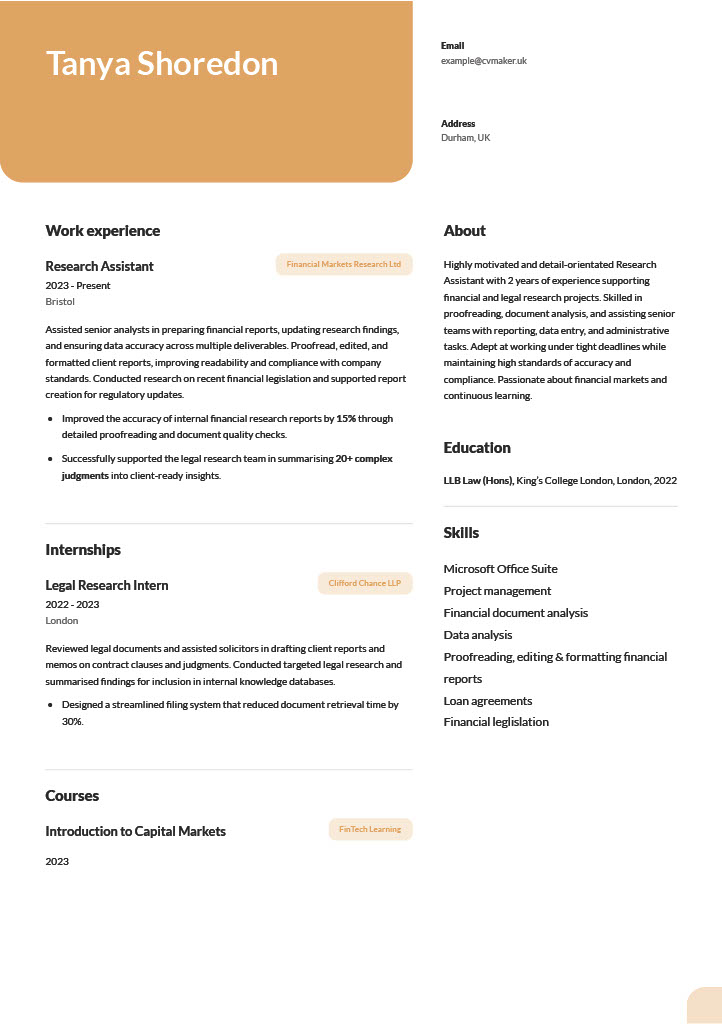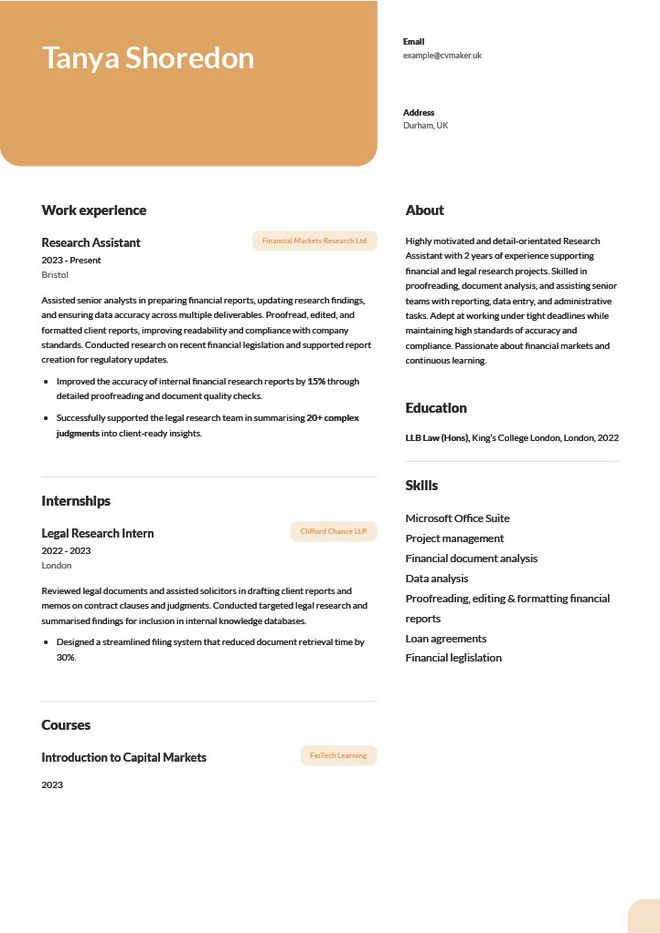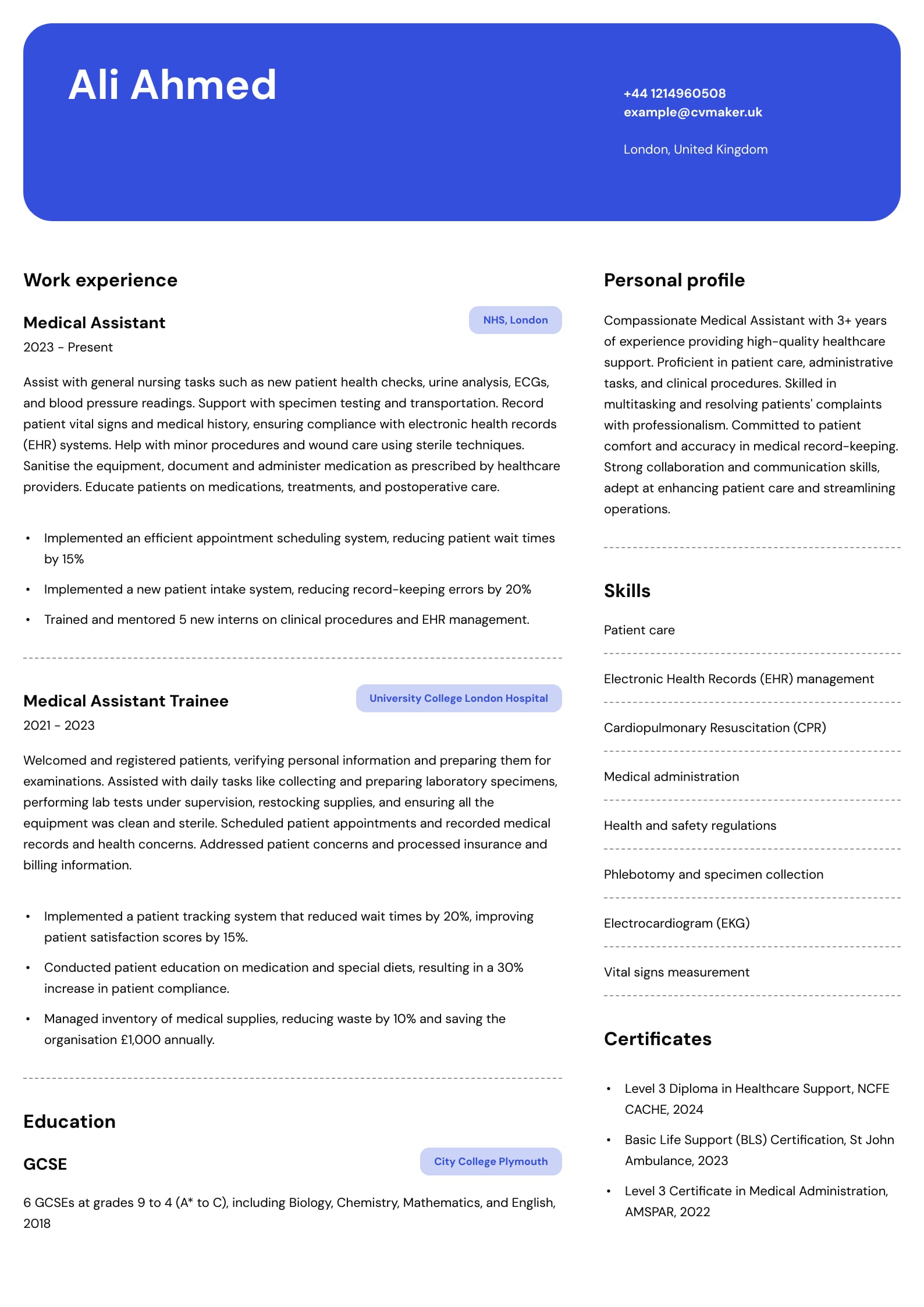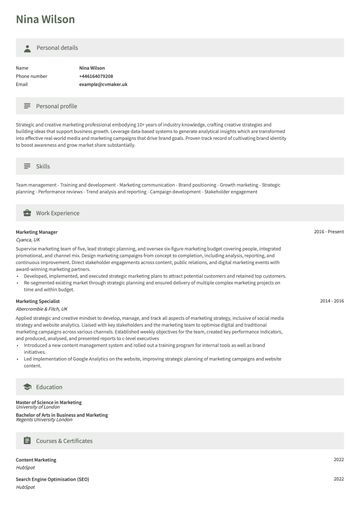
How to Write a Research Assistant CV: Tips and Examples
Top-quality research assistants are in demand across the UK, with successful applicants blending sharp analytical thinking with precise written communication and time management.
Preparing a modern CV using a professional applicant tracking system (ATS)-friendly CV template that quickly communicates your value is essential. In a competitive market, a well-structured CV tailored to the role can make the difference between landing an interview or being overlooked by hiring managers.
In this article, we’ll guide you through:
What key sections to include for a good CV.
Relevant skills and work experience examples to boost your CV.
How to write a CV for a research assistant if you have no experience.
Streamline your CV writing process with CVMaker, featuring intuitive designs and advice on how to choose the best CV template.
Customise this research assistant CV example
Research assistant CV example
 Download research assistant CV in PDF.
Download research assistant CV in PDF.
Tanya is a detail-orientated research assistant with 2+ years of experience in financial and legal research. Her CV showcases technical and soft skills through measurable achievements. By highlighting a concise work experience section and relevant courses, she demonstrates job fit. The Columbia CV template presents Tanya's professional development clearly and concisely, ideal for a research assistant CV for UK applications.
What to include in a research assistant CV?
To keep your CV for a research assistant readable and ATS-friendly, create a tailored CV and structure the document as follows:
Contact details: include your full name, email address, mobile number, and location (city/town). Adding a LinkedIn profile or academic portfolio link is also recommended.
Personal profile: a 60–80 word summary outlining your experience, career goals, and core strengths.
Education: list your highest qualification first (e.g., degree), then GCSEs and A-levels if relevant. Include modules or dissertations that demonstrate strong research skills.
Work experience: detail relevant roles or academic research projects. Use bullet points to show measurable achievements, such as improving report accuracy or managing data collection.
Skills: include hard skills like SPSS, Excel, or literature reviews, and soft skills such as problem-solving, organisation, and time management.
Certifications: add any professional development, such as Good Clinical Practice (GCP) training, research ethics courses, or data protection compliance certifications.
Additional sections (optional): Consider adding CV sections such as languages, publications, awards on a CV, volunteering, or professional memberships related to research.
Must-have CV sections
Personal profile
Skills section
Work experience
Education
Learn more about how to write a good CV.
Keywords to include in a research assistant CV
Optimising your CV for applicant tracking systems (ATS) and recruiter searches means integrating role-specific CV keywords. These terms reflect core responsibilities, technical expertise and soft skills expected in research roles.
Effective keywords and phrases to add naturally in your CV
Pro Tip
Always tailor these keywords to match the specific job description. For instance, if an ad mentions “quantitative analysis”, use that exact term rather than a synonym like “numerical analysis.”
How to list research assistant skills in a CV
Your CV skills section should be concise, easy to scan, and clearly divided between hard skills (technical abilities) and soft skills (interpersonal abilities). Use bullet points rather than sentences to keep the section clean and ATS-friendly.
Aim for 5–10 skills, prioritising those from the job description. Refer to similar positions that share overlapping skills and occupations and explore CV examples for data analyst, IT, product designer, and project manager.
Essential research assistant skills to include in a CV
Data analysis: cleaning, analysing, and interpreting quantitative/qualitative data to answer research questions.
Project management: planning timelines, coordinating stakeholders, and delivering milestones on time.
Data collection: designing tools (surveys, CRFs), running interviews, and maintaining data integrity.
Technical skills: using software (e.g., Excel, SPSS, REDCap), lab techniques, and documentation standards.
Communication: writing reports, presenting findings, and collaborating across disciplines.
When writing your personal profile, include 2–3 soft skills naturally by pairing them with actions and outcomes.
“Known for clear communication and strong time management, I successfully supported multiple research projects simultaneously while maintaining 100% accuracy in data reporting.”
| Hard skills | Soft skills |
|---|---|
| Data analysis (SPSS, Excel, Python basics) | Attention to detail |
| Literature reviews | Time management |
| Research methods | Communication (written and verbal) |
| Regulatory compliance | Problem-solving |
| Data collection | Critical thinking |
| Report writing | Team collaboration |
| Database management (REDCap, SQL) | Organisation |
| Financial document review | Adaptability |
| Survey design | Analytical |
Show hard skills in the work experience section by tying the tool or method to an achievement or outcome. This makes it more powerful than a simple list.
"Used SPSS to analyse 1,200 survey responses, identifying patterns that informed a revised research protocol and reduced data processing time by 18%.”
How to write a personal profile for a research assistant CV
Your personal profile is the first thing hiring managers read, making it your best chance to grab their attention. Think of it as a 60–80 word elevator pitch summarising who you are, what you bring, and your career goals.
The secret to a strong profile?
Blend hard evidence with personality by including top soft skills and transferable skills. While technical expertise is important, employers also value qualities like communication, adaptability, and time management.
Learn more about how to successfully pitch yourself in a personal profile.
Clinical research assistant CV personal profile example
Organised Clinical Research Assistant with 3+ years of experience supporting Phase II/III trials in hospital and academic settings. Skilled in data collection, patient liaison, and regulatory compliance (ICH-GCP). Known for attention to detail and timely documentation, collaborating with cross-functional teams to meet milestones. Motivated by improving patient outcomes through accurate, data-driven insights.
Psychology research assistant CV personal profile example
Analytical Psychology Research Assistant with 2 years’ experience in cognitive and behavioural studies. Proficient with SPSS, survey design, and qualitative interviewing; adept at literature reviews and ethics submissions. Communicates findings clearly to both academic audiences and participants. Thrives in research projects requiring meticulous data analysis and collaborative teamwork.
Research administrator CV personal profile example
Efficient Research Administrator with 4+ years of experience supporting multi-site studies in university and NHS environments. Strong command of document control, budget tracking, and trial master files. Recognised for proactive stakeholder communication and project management that keeps work experience sections measurable. Streamlines processes to reduce errors and accelerate delivery.
Senior research assistant CV personal profile example
Results-orientated Senior Research Assistant with 8+ years’ experience across healthcare and sustainability research. Leads cross-functional teams, mentors juniors, and produces data-driven reports for publication. Advanced skills in technical documentation, ethics governance, and stakeholder engagement. Known for translating complex datasets into practical recommendations.
Entry-level research assistantCV personal profile example
Recent Biomedical Science graduate with internship experience in lab techniques, data collection, and literature reviews. Skilled in Excel, database entry, and preparing SOPs. Eager to contribute to research projects and develop technical skills under senior supervision. Eager to bring strong soft skills, reliability, communication, and time management to a new role.
Pro Tip
Include 2–3 soft skills into a results-orientated sentence. For example: “Known for clear communication and meticulous planning, supporting cross-functional teams to deliver ethically compliant studies on time.”
Refer to these applicable research industries for more CV examples:
How to list work experience in a research assistant CV
Your work experience section should clearly demonstrate your contributions, responsibilities, and measurable achievements. Always use reverse chronological order, starting with your most recent position.
What should each work experience entry include?
Job title of current or previous role
Organisation name and location
Dates of employment (month/year)
A concise paragraph detailing your duties
Followed by 2–3 bullet points using CV action verbs that highlight your key achievements or measurable impact.
Learn more about the work experience section in a CV.
Good versus bad achievement examples for work history
Good
"Created a simple R script to clean study data (1,200 records), cutting prep time by 40% and fixing 18% of missing entries; shared the steps so the team can reuse it."
Bad
"Helped with research when needed and worked really hard."
Good
"Helped write a systematic review (38 papers), ran the basic analysis, and produced clear charts that were used in the draft journal article."
Bad
"Did lots of experiments and made some graphs for the team"
Research assistant CV work experience examples
Research assistant, Financial Markets Research Ltd, London, 2023 – Present
Assisted analysts in delivering market insights and regulatory updates for institutional clients. Conducted targeted research on financial legislation; summarised findings for inclusion in compliance reports.
Improved accuracy of internal financial research reports by 15% through detailed proofreading and data validation
Designed a streamlined Excel-based system for updating quarterly forecasts, reducing reporting time by 30%.
Researcher, BrightMedia Marketing Analytics, Manchester, 2022-2023
Supported the marketing insights team with consumer research projects and campaign performance tracking. Created visual dashboards in Excel for campaign performance, improving reporting efficiency.
Collected and analysed customer behaviour data from 1,500 survey responses, identifying patterns to optimise ad spend
Compiled competitor analysis reports using Google Analytics and SEM tools, influencing a 20% increase in CTR for digital campaigns.
Research Administration, Green Future Initiative, Bristol, 2021-2024
Collaborated with sustainability consultants to conduct environmental impact assessments and draft policy reports. Coordinated stakeholder interviews and summarised findings into actionable recommendations.
Researched energy consumption data across 50+ organisations, highlighting opportunities for carbon footprint reduction
Assisted in preparing a white paper on ESG compliance, later used in a government sustainability briefing.
Clinical Research Assistant | Innovate AI Labs, Cambridge, 2022-2023
Worked with data scientists to support machine learning research for predictive analytics projects. Documented test results and prepared reports for internal technical teams and external stakeholders.
Contributed to research on natural language processing by preparing evaluation metrics for algorithm performance.
Cleaned and labelled large datasets (over 100,000 entries) for training AI models, ensuring data integrity
Designed and distributed online surveys and conducted user interviews with over 200 participants, generating actionable insights that improved product usability scores by 18%.
Graduate Research Assistant , Work Placement, University Research Lab, 2024
Gained hands-on experience in academic research while completing final-year dissertation.Presented findings to a departmental committee; feedback incorporated into the final published report.
Assisted in data collection for a behavioural psychology study involving 150 participants, achieving 98% accuracy in data entry
Conducted a literature review of 300+ abstracts, extracting 75 relevant studies for systematic analysis.
How to include education on a research assistant CV
Your CV education section should appear below work experience (or at the top if you are a graduate or student with little experience). Including courses and certificates on a research assistant CV can emphasise your academic preparation and technical skills.
Highlight advanced coursework in research methods, statistics, or subject-specific areas that directly support the research focus. Certificates in tools like SPSS, R, Python, data analysis, or research ethics can strengthen your credibility and show proficiency to employers.
How to format educational qualifications
Degree
[Degree title], [Institution], [Location], [Year of graduation]
LLB Law (Hons), King’s College London, London, 2019 – 2023 | Relevant Modules: Research Methods, Legal Writing, Financial Regulation Dissertation: “The Impact of ESG Regulation on Corporate Governance
A-Levels
[Qualification name], [Institution], [Location], [Years completed]
A-Levels: Biology (A), Chemistry (B), Mathematics (B), Durham Sixth Form, 2023
Tips for writing a research assistant CV with no experience
If you’re changing careers from another field or are transitioning into the workforce, transferable skills like organisation, project coordination, and data handling can show you’re prepared for research work.
Showcase academic projects, dissertations, and any internships or apprenticeships by describing them like work experience: “Completed a systematic literature review analysing 200+ academic papers and synthesised findings into a comprehensive report.” If you have little work experience, consider using a skills-based CV format.
Networking is another powerful way to break into research roles. Attend job fairs, university events, and industry conferences to meet employers. Find part-time or volunteering roles in administration, hospitality or retail. Demonstrate soft skills like communication and time management, framing them in a research context: “Managed data entry and reporting for daily sales, ensuring 100% accuracy under tight deadlines.”
Learn more about how to write a CV with little to no experience for a research assistant job application.
Essentials for a research assistant CV
A professional CV requires a strategic approach to stand out in a competitive research job market. Demonstrate technical skills, highlight academic achievements, and show strong technical skills. Tailor your personal profile and work experience to show recruiters why you’re the right fit. To improve your CV write a compelling cover letter and formatted with a clean, professional design.
Dos and don’ts for a research assistant CV
Dos
Keep your CV clear and concise. Only include relevant information tailored to the job.
Write a tailored cover letter and browse these professional templates for a complete application.
Proofread and check for spelling or grammar errors!
Don’ts
Include a photo on your CV.
Put your full address, this is unnecessary in the UK. Find out what information to include in your contact details.
Rely solely on AI tools.
Next steps?
Ready to land your next research assistant job? Explore our expert CV guides and career blog for tips on choosing the best CV format. Pair your application with a professional cover letter, track your job applications, and learn how to send your CV via email to recruiters. If you’re applying without experience, check out the most sought-after skills and practice essential interview questions to get fully prepared.
FAQs
How long should a research assistant CV be?
Your CV should be 1–2 pages depending on experience. Find more tips on how long a CV should be.
How much do research assistants make in the UK?
According to GlassDoor, research assistants typically earn £23,000 to £34,000 per year, depending on experience, industry, and location.
How do you become a research assistant?
You typically need a relevant degree and experience with research tools, supported by strong analytical and communication skills. Explore other research roles with the National Careers Service and the most influential industries where research skills are in demand.






)

)